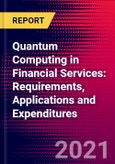This new report analyzes the opportunity for quantum computing in the financial services sector and forecasts its level of capital and service expenditures on quantum computing in the next five years. The publisher believes that this sector has the funds to support significant investment in quantum computing and also that there are abundant applications for quantum computing in financial services going forward. Some of the interviewees for this report were “frustrated” that their companies were not focusing sufficiently on the opportunities that they saw in quantum computers. Others thought their organizations were too distracted by the hype associated with quantum computing.
This report sorts out where quantum computing really sits as a future tool for the financial services industry. Here we note that many of the largest banks and other financial institutions already have substantial quantum computing teams in place. With this in mind, this report includes profiles of the internal quantum computing development work being done by 18 leading financial institutions comprising, ABN AMRO, Barclays, BBVA, BNP Paribas, CaixaBank, Citigroup, Commonwealth Bank of Australia, Goldman Sachs, HSBC, JPMorgan, Mizuho Financial Group, Mitsubishi Financial Group, NatWest, Nomura Securities, ScotiaBank, Standard Chartered, UBS and Wells Fargo.
While some credit card companies and insurance companies are also expressing interest, this report finds that it is banks that are publishing research and defining partnerships. Also, the key to this market is a handful of quantum computing firms that are focused specifically on the financial services sector. Many of these are also profiled in this report including QuantFi, JoS QUANTUM, Nordic, Quantum Computing Group (NQCG), Multiverse Computing, Quantum Mads, QC Ware and 1Qbit.
The report also discusses the many potential applications for quantum computing in the financial services industry that the publisher believes will become prominent in the coming years. These will include trade settlements, risk modeling, accelerating AI/ML, goals-based investment, portfolio construction, tax-loss harvesting, fraud detection, analytics-driven CRM, dynamic portfolio management, credit scoring, currency arbitrage, and derivative pricing. For each of these areas, we take a look at how quantum computing can add efficiencies and profitability to financial institutions.
As with other reports by the publisher, the forecasts for this report are included in a separate spreadsheet, enabling the reader to play “what if” games. The numbers presented here are based on the publisher's forecast models for the entire quantum technology market.
The report is based on both primary and secondary research. The primary research included interviews with leading financial institutions as well as on the ongoing interviews carried out by the publisher throughout the quantum technology sector and end-user base. The secondary research consists of reviews of both technical and business articles related to quantum computing as well as the websites of commercial firms and other organizations involved.
The publisher believes that quantum computing has the potential to disrupt financial services to the same degree that occurred with digital computing and high frequency trading in the past. We believe that this report will become required reading for marketing and business development executives at quantum computer companies and cloud vendors as well as managers in financial institutions themselves.
Table of Contents
Companies Mentioned
- 1Qbit
- ABN AMRO
- Barclays
- BBVA
- BNP Paribas
- CaixaBank
- Citigroup
- CogniFrame
- Commonwealth Bank of Australia
- Goldman Sachs
- HSBC
- JoS QUANTUM
- JPMorgan
- Mitsubishi Financial Group
- Mizuho Financial Group
- Multiverse Computing
- NatWest
- Nomura Securities
- Nordic Quantum Computing Group (NQCG)
- QC Ware
- QuantFi
- Quantum Mads
- ScotiaBank
- Standard Chartered
- UBS
- Wells Fargo








